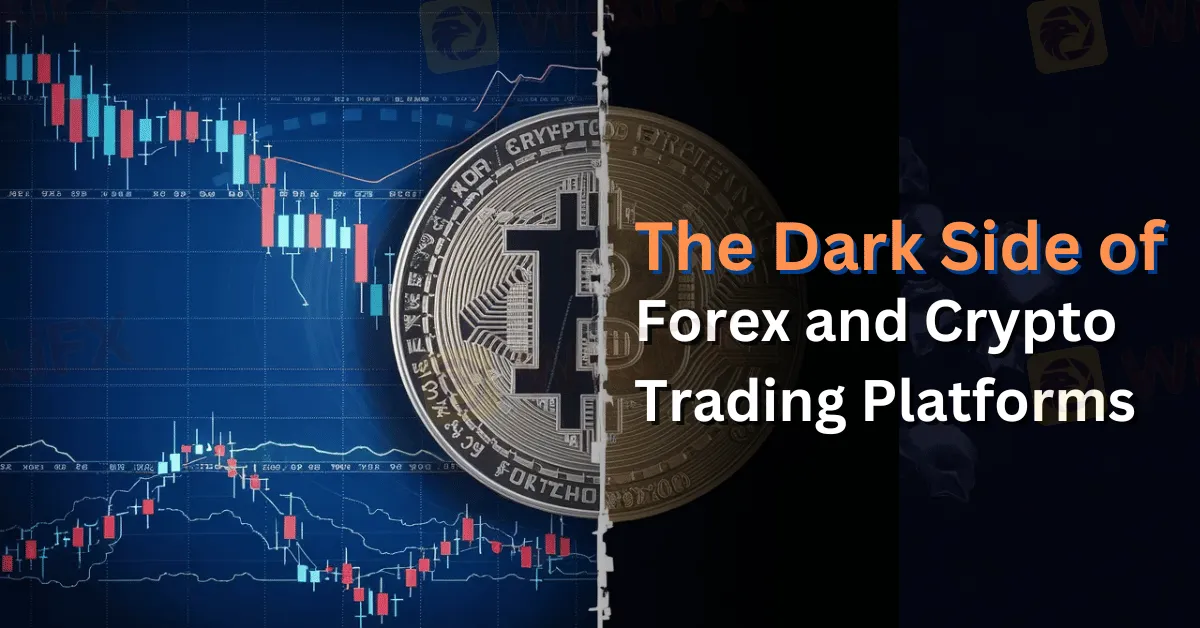The Dark Side of Forex and Crypto Trading Platforms
Abstract:Why are Forex and crypto trading platforms notorious for scams and pyramid schemes?

The allure of high returns in the foreign exchange (forex) and cryptocurrency markets has captivated millions worldwide. These markets promise substantial profits, and the advent of online trading platforms has made it easier than ever for individuals to participate. However, the same factors that attract genuine investors also entice fraudsters. Forex and crypto trading platforms have become notorious for scams and pyramid schemes, tarnishing the reputation of these markets and causing significant financial losses to unsuspecting investors.
One of the primary reasons forex and crypto trading platforms are prone to fraud is the lack of regulation. Unlike traditional financial markets, which are subject to stringent regulatory oversight, the forex and crypto markets operate in a relatively unregulated environment. This regulatory vacuum creates opportunities for unscrupulous entities to exploit investors. Many platforms operate without proper licenses, making it difficult for investors to verify their legitimacy.
The inherent complexity and volatility of the forex and cryptocurrency markets also contribute to their susceptibility to fraud. These markets are often difficult for novice investors to understand, making them easy targets for fraudsters who promise guaranteed returns or “foolproof” trading strategies. The rapid price fluctuations in these markets can also be manipulated by fraudulent platforms to create the illusion of high returns, luring more victims into the scam.

Ponzi and pyramid schemes are prevalent in the forex and crypto trading sectors. In a Ponzi scheme, returns are paid to earlier investors using the capital from newer investors, creating a facade of a profitable venture. Pyramid schemes, on the other hand, require investors to recruit others to join the platform, promising them a share of the profits generated by their recruits. Both schemes are unsustainable and collapse once new investment dries up, leaving the majority of participants with significant losses.
Another common fraudulent tactic involves creating fake trading platforms that mimic legitimate ones. These platforms often use sophisticated marketing tactics and fake testimonials to appear credible. Once investors deposit their funds, they may see fictitious profits generated in their accounts. However, when they attempt to withdraw their money, they encounter delays, excuses, or outright refusals. Eventually, the platform disappears, taking the investors' funds with it.
Signal sellers and expert advisors (EAs) are also a source of fraud in the forex and crypto markets. Signal sellers offer trading signals that purportedly indicate the best times to buy or sell assets. EAs are automated trading programs that claim to execute profitable trades on behalf of the investor. In many cases, these products are sold at high prices and fail to deliver the promised results. Some are even designed to generate losses, benefiting the fraudsters through undisclosed fees or commissions.
Investors must exercise due diligence before committing their funds to any trading platform. This involves verifying the platform's regulatory status, researching its reputation, and being wary of unrealistic promises of high returns. Legitimate platforms are usually registered with relevant financial authorities and provide transparent information about their operations.

In this landscape fraught with risks, WikiFX can be an invaluable resource for investors. WikiFX is a professional platform that provides comprehensive information about online brokers, including their regulatory status, user reviews, and credibility scores. By using WikiFX, investors can quickly check the legitimacy of a trading platform and avoid fraudulent operators. The platform's detailed reports and user feedback can help investors make informed decisions, reducing the likelihood of falling prey to scams.
Education is a crucial tool in protecting oneself from fraud. Investors should seek to understand the basics of forex and crypto trading, including the risks involved. Being vigilant and sceptical of too-good-to-be-true offers can help investors avoid falling victim to scams.
Opting for well-known and established trading platforms can significantly reduce the risk of fraud. Reputable platforms are more likely to adhere to regulatory standards and have robust security measures in place to protect investors' funds.
In conclusion, while the forex and cryptocurrency markets offer substantial opportunities for profit, they are also rife with fraud and pyramid schemes. By staying informed, conducting thorough research, leveraging tools like WikiFX, and choosing reputable platforms, investors can navigate these markets more safely and avoid the traps set by fraudulent operators.

Read more

Trading is Not Gambling—Unless You Make It So
In the world of online trading, a common misconception persists: trading is often seen as no different from gambling. This belief is particularly prevalent among newcomers, who may view the financial markets as a fast-paced game where winning is just a matter of luck. But trading, when done correctly, is far from mere chance!

JPMorgan Expands Rapid Forex Settlements with JPM Coin Blockchain
JPMorgan to offer instant USD/EUR settlements via JPM Coin, with plans to include GBP. Blockchain tech aims to streamline forex for fintech firms.

Polish Financial Regulator Issues Warning on Crypto.com
The Polish Financial Supervision Authority (KNF) has recently issued a cautionary warning regarding Foris DAX MT, the Malta-based entity operating under the Crypto.com brand

FCA Convicts 2 Individuals from CCX Capital & Astaria Group in £1.5M Crypto Scam
The Financial Conduct Authority (FCA) recently secured convictions against Raymondip Bedi and Patrick Mavanga, from CCX Capital and Astaria Group respectively, for orchestrating a £1.5 million investment fraud that affected over 65 investors between February 2017 and June 2019.
WikiFX Broker
Latest News
US Presidential Election in Overdrive: Exploring Forex Wealth Codes with WikiFX App
Do You Really Know Your Trading Game?
CySEC Tightens Compliance Rules for Crypto and FX/CFD Brokers
Will Trump's reelection drive more market growth?
How U.S. Elections Have Influenced Financial Market Trends Since 2000
Zenstox: A Trader’s Nightmare? An Inside Look at Alleged Scams and Unethical Practices
eToro sponsors the Bitcoin Mena Conference
FCA WARNING AGAINST Touchstone Markets
Caroline Ellison Begins Two-Year Sentence for FTX Scandal
FCA Convicts 2 Individuals from CCX Capital & Astaria Group in £1.5M Crypto Scam
Rate Calc
